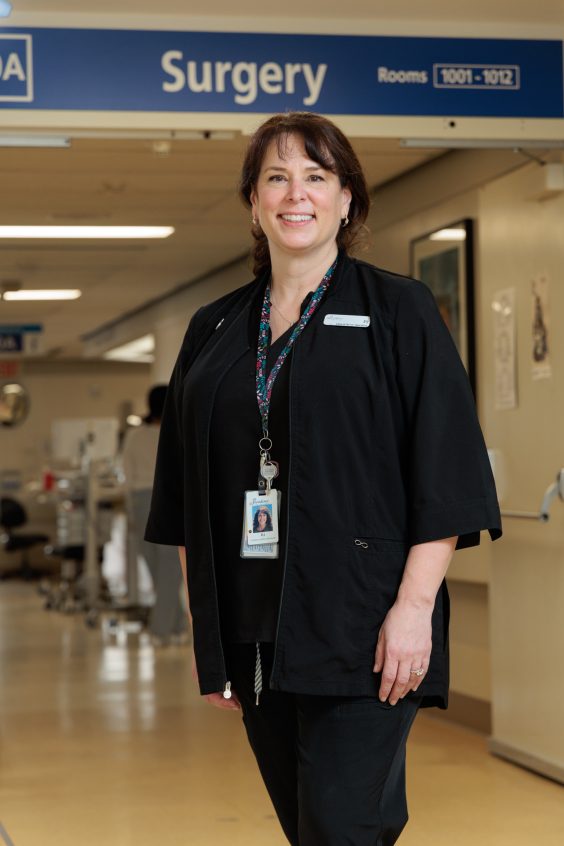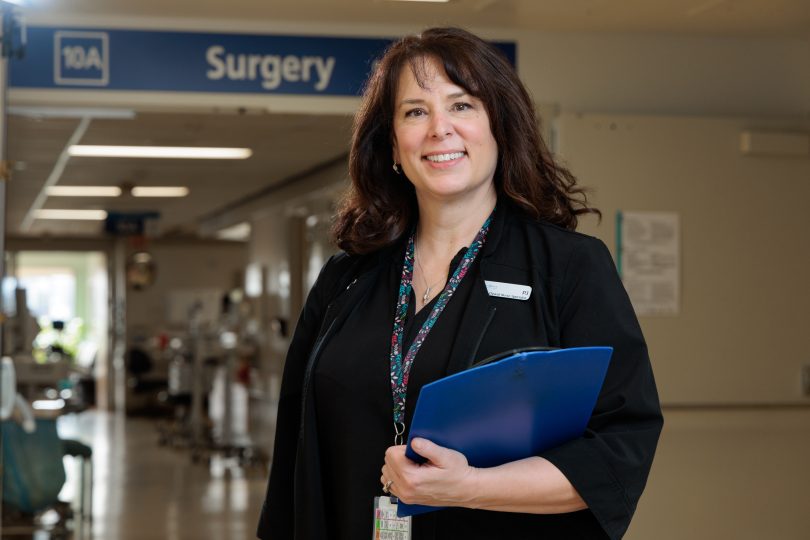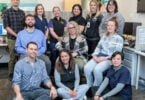National Nursing Week begins today across Canada, running to May 14. At Providence Health Care, close to 3,000 nurses, representing a broad range of roles and disciplines across numerous sites care for hundreds of patients and residents every day. To mark this week, we’re profiling five of the many nurses who play such a vital role in the well-being of those Providence serves. Today, meet PJ Matras.
Her father’s diagnosis of terminal cancer changed everything for PJ Matras.
The Clinical Nurse Specialist for Pain Management at St. Paul’s Hospital was just out of high school, working with an investment company with plans to become an accountant, when her father was diagnosed with metastatic cancer.
Still just a teen, she gave up her job to become his main care giver. It was an emotional time for a young woman to deal with several big life events at once: the news of her dad’s illness, and the swift career change that it prompted.
But she plunged in, learning the nursing techniques for her dad’s care from his hospital care team and from the Victorian Order of Nurses, a community- and home-care nursing organization.
A family member noticed how quickly she took to the task, along with the skill and care she provided her father and told her, ‘You know, you could be a great nurse.’
Matras took the idea to heart, and graduated from a hospital-based program in 1992.
The most meaningful part of the career switch was that her dad was able to see her in her student nurse uniform before he died. “I swear, he was never prouder.”
Since becoming a nurse, she has worked in different hospitals and nursing disciplines ranging from long-term care, cardiology, critical care and the intensive care unit.
She joined Providence in 2016 in her current role.
A CNS can work in different settings, including hospitals, clinics, and the community. They work to improve patient outcomes and advance the field of nursing, whether by developing policies and procedures, implementing quality improvement initiatives or collaborating with other health care professionals to ensure that patients receive the best, safest care possible.
And they are directly involved in patient care, which Matras loves.
The position required a Masters degree in nursing, which she obtained in 2014, along with clinical experience in pain management.
At St. Paul’s, she focuses on managing the pain of mostly (but not exclusively) surgical patients.
A typical day starts with meeting the hospital’s Acute Pain Service team to review their patients’ status and note any urgent needs. Next, she does rounds and creates individualized patient plans. She can see as many as 20 patients on any given day.

She regularly examines whether the tools in place to help pain patients are safe, appropriate and timely. “If it’s in place, is it being done? If it’s not, what is missing? And how can we fix it?”
She meets with other nurses in leadership roles, including Clinical Nurse Leaders and Clinical Nurse Educators to deal with any issues, then touches base with nurses providing direct bedside care.
Finally, she and anesthesiologists review pain plans as a team.
The afternoons are a mix of rounds, meeting with new patients, and improving pain-care plans, such as adjusting medications as needed.
She loves the variety of work and the ability to work with teams that include “exceptional anesthesiologists, absolutely incredible nurses and nurse leaders and most importantly, the patients, so I can promote optimal, safe pain management for them.”
“I have been able to see nursing from many different vantage points and experience an incredible diverse career.”
It is the feedback from patients that ranks among the top things she treasures most about her work.
“Recently I was working with a patient who was experiencing an unexpected pain escalation that was scary and traumatic.”
“I was able to work with her and develop a trusting therapeutic relationship. We created a plan together that worked for her.”
When the patient was discharged, she gave Matras a card. “It said, ‘thank you (…) I felt looked after & in capable hands. You got me through those hard days’.
Of course, it is a team effort, but this is the biggest compliment.”
“As I tell all new hires, this is the best place to work. I am so proud to be a nurse at Providence.”
Story by Ann Gibbon, Providence Health Care





